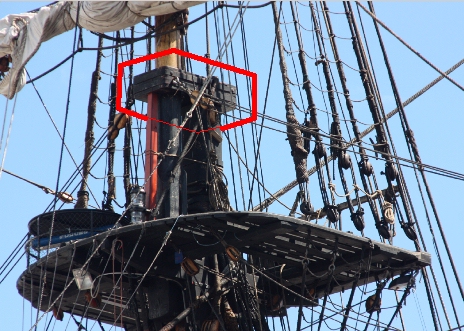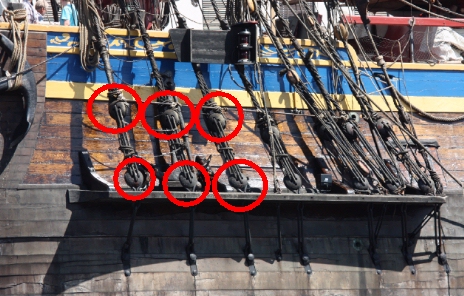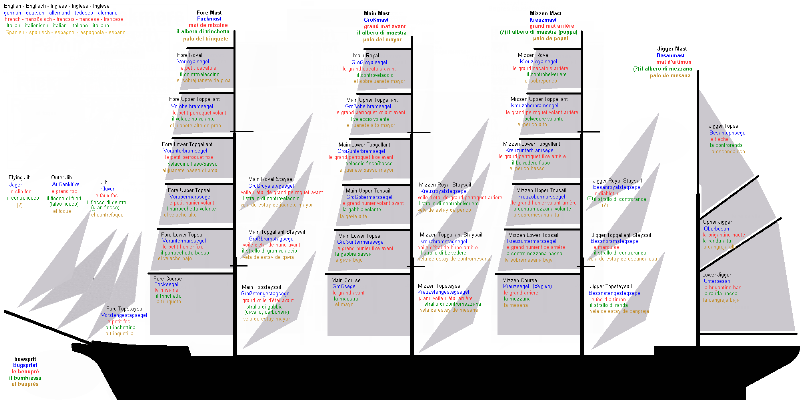Maritime Dictionary
|
Every coastal country has a long navigation tradition. They developed a broad maritime vocabulary that sounds like bafflegab to ordinary people (the landlubbers). And when You campare these terms, it becomes even more funny! Here are two examples:
Languages are funny! Two completely different parts of the rigging may have the same or a similar name in different languages, or the name has wandered from one thing to another: the French "mat de mizaine" does NOT match the English "mizzen mast", but the "foremast"!!!
So, guessing from one language into another does not always work ... compare the sail names in English, German, French, Italian and Spanish - it will make You wonder!
There are some expressions that are common among many nations but one nation. E.g. Dutchmen do not say "royal sail" - why not ? They have a monarchy, and they have had this type of rigging on their ships: another sail above the topgallant. Well ... history tells: The Dutch and the Brits always had some "quarrels" when they competed for colonies. In Dutch, "Royal" was a synonym for "British" - so simple. So, the Dutchmen say "bovenbram = Upper Topgallant", which is known in English but it came up much later, when the topgallants were devided into lower and upper for their size. (It is just like the Americans today, saying "French fries" instead of "pommes frites".) The famous British "Royal Sovereign", a mixture of an giant battleship and golden king´s palace that ruled the North Sea between 1637 and 1690, was nicknamed the "Golden Devil" by the Dutchmen. And many British Navy ships´ names traditionally began with "Royal". Since the United Kingdom established its rule of the world, English became the lingua franca of seamanship. But many seamen proudly kept their languages, but took over many words. The English "captain" is "Käpt´n" in German and "Kapten" in Swedish - with almost the same pronounciation. The same way, the Mediterranian languages share "capitan". The Japanese "Kan-Chou"(艦長) sounds like it only by coincidence, because the two syllables are Japanese readings of Chinese characters, that Japan "imported" since about 1000 A.D.: "Kan"(艦) means ship and "Chou"(長) means chief or leader. But, You still find most of Japanese rigging terms derived from English, but "chopped" into Katakana syllable characters, like "seru", from English "sail", often pronounced as "s´l". This is because the rigging type was "imported" when the British Empire was at its peak and all seamen spoke English. With the migrations of seamen and ships carpenters, the languages mixed with each other, and many words were integrated just vocally and sometimes "cut" in strange patterns. Thus You find many Dutch words in North European languages, and also in Polish and Russian! These languages had no linguistic relations, and the origin of some words are hard to recognize. If You recognize them, it can be fun! "Why all this work ? Isn´t there something like this already in the internet ?" - No, there is not, unfortunately. I surfed around for a looong time and found just a handfull of pages. That is why I make this site. And when I am already at work for this (I like it) ... Even using the best and thickest universal dictionaries, You do not find many maritime words in them. They may contain 150.000 words, and You find 100 maritime words. Something like "Upper topgallant sail" is seldomly noted. My own tiny database contains over 10.000 words, and I used many sources. The ignition for my hobby was my visit of the portuguese "Sagres II" at the Sail 2005 in Bremerhafen, Germany. At the beginning, I just wanted to know the belayings for the lines coming down from the mast - I wanted to build a model correctly after this. Where is the halyard, where the brails, and so on ... The cadets explained many things to me - in a mixture of English and Portuguese - and my native language is German. They gave me copies of their education books that showed all the belaying pins in a diagram - that was the key to all words. Together we translated all from Portuguese into English, and back home I did the rest in German. But now I was even more curious than before ... Of course, I do not speak all of the 18 languages that I present here. I only speak German, English, Swedish and Japanese. The rest is pure curiosity of mine. I take all terms that I can reach from those many sources and compile them to one database. For the languages I cannot speak, I learned some basics and grammar, and then I do it like this: Dutch sounds very closed to a North German dialect (Plattdeutsch) in German eyes and ears. Swedish (where I live now) is very much related to the other Scandinavian languages Danish and Norwegian (but not at all to Finnish!). I had had some years of Latin and French at school, that helps me in the romanic languages French, Spanish, Italian and Portuguese. Romanian is another romanic language in Eastern Europe. Russian, Polish and other Eastern European languages share most of the grammar and many words. Chinese looks similar to Japanese because Japanese use Chinese characters - but it only looks like that, it is pronounced completly different, and has another grammar. And Corean are just between these two languages, although they all cannot understand each other. But Greek and Turkish are a book of 6½ seals to me, I only know some basic about it, so I would appreciate any comments. If You feel that some error should be corrected, please drop me a line to j_gelbrich@gmx.net!
These multilingual lists are of course not completely translated ... that is:
There are updates to come ...
|
 : mast cap (English)
: mast cap (English)
 : das Eselshaupt (German)
: das Eselshaupt (German)
 : ezelshoofd (Dutch)
: ezelshoofd (Dutch)
 : æselhoved (Danish)
: æselhoved (Danish)
 : eselhoed (Norwegian)
: eselhoed (Norwegian)
 : äselhuvud (Swedish)
: äselhuvud (Swedish)
 : esseli (Finnish)
: esseli (Finnish)
 : езелгофт {ezelgoft} (Russian)
: езелгофт {ezelgoft} (Russian)




 French ( français )
French ( français )
 Italian ( italiano )
Italian ( italiano )
 Spanish ( español )
Spanish ( español )
 Portuguese ( português )
Portuguese ( português )
 Romanian ( română )
Romanian ( română )


 Polish ( polski )
Polish ( polski )
 Greek ( Eλληνικά )
Greek ( Eλληνικά )
 Turkish ( türkçe )
Turkish ( türkçe )

 Japanese ( 日本語 )
Japanese ( 日本語 )
 Chinese ( 中文 )
Chinese ( 中文 )
 Korean ( 한국어 )
Korean ( 한국어 )